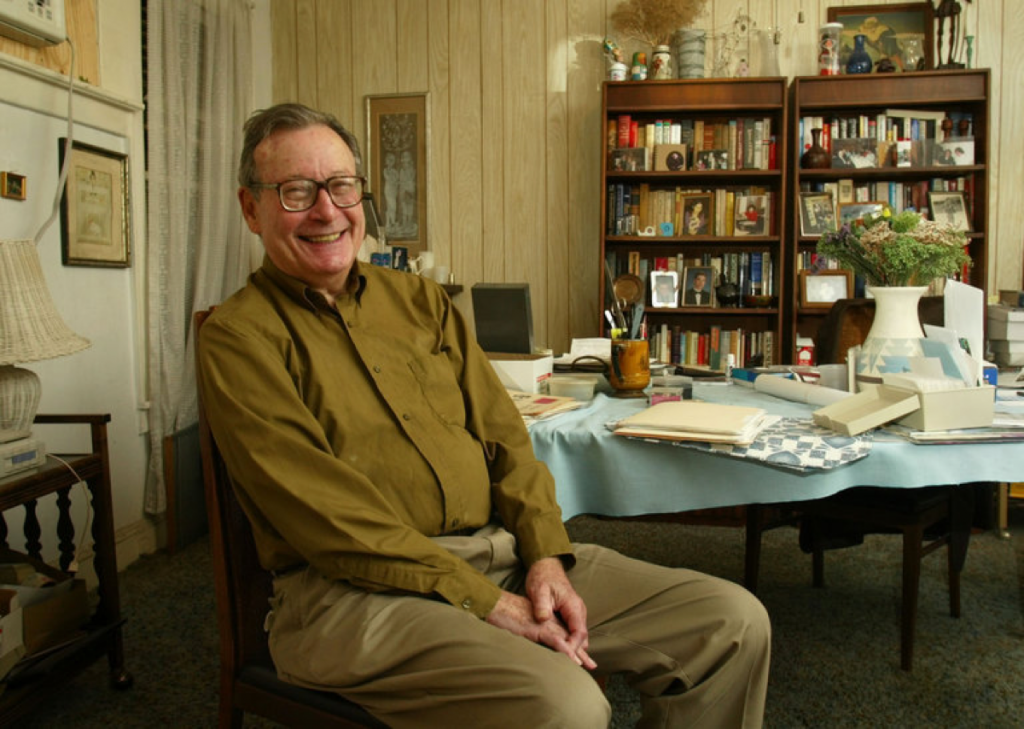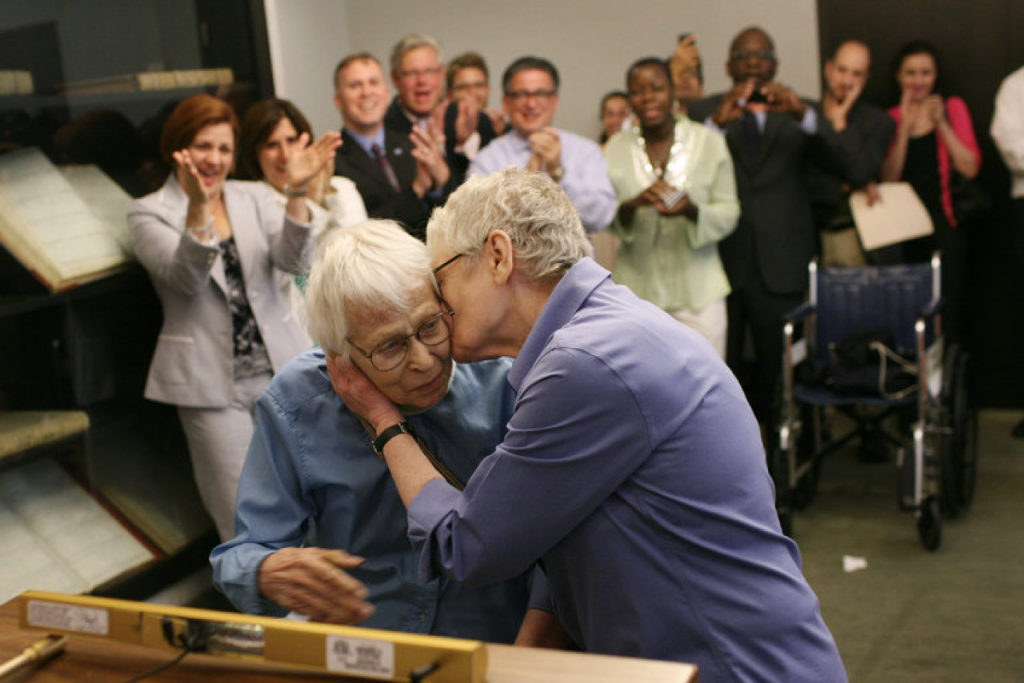Remembering Connie Kopelov and Henry Foner
The New York Labor History Association lost two of our long time Board members in the last year, Connie Kopelov and Henry Foner. Their remarkable lives were both featured recently in the New York Times:
Henry J. Foner, Labor Leader Accused of Communist Ties,
Dies at 97By Sam Roberts
JAN. 19, 2017Henry J. Foner, a labor leader and champion of progressive causes, in 2002. CreditJames Estrin/The New York Times
Henry J. Foner, the last of four brothers from New York City who were denied academic jobs in the 1940s for Communist ties and later were champions of organized labor, higher education and progressive political causes, died on Jan. 11 in Brooklyn. He was 97.
The cause was cardiovascular disease, said his nephew, Prof. Eric Foner, a historian at Columbia University.
Mr. Foner led the once-thriving fur and leather workers union in New York and was a leader of the Liberal Party, which is now largely moribund but played a pivotal role in local politics for three decades starting in the 1950s.
“Along with his brother Moe, Henry was among a group of labor leaders who survived McCarthyism to bring a New Deal kind of left-labor activism to New York City, which survives to this day,” Professor Foner said. “They also challenged the A.F.L.-C.I.O. to mobilize against the Vietnam War.”
The Foner brothers, sons of Jewish immigrants from Eastern Europe, grew up in the Williamsburg section of Brooklyn, opposing fascism in Spain and embracing other causes. The two oldest, Philip and Jack, who were twins, taught at City College of New York, as did Moe; Henry was a high school teacher.
In the 1940s, after being implicated by a former houseguest, they were accused by the New York State Joint Legislative Committee to Investigate the Educational System, known as the Rapp-Coudert Committee, of belonging to subversive organizations, including the Young Communist League.
As a result, all four lost, resigned from or were denied teaching jobs.
Eventually, the older Foner brothers resumed teaching — Philip at Lincoln University, a historically black institution near Philadelphia, and Jack at Colby College in Maine, where he established one of the first black studies programs in New England. (Eric Foner is Jack’s son.)
Moe, who was also fired by City College (his daughter, Nancy, is a sociology professor at Hunter College, another part of the City University of New York system), was instrumental in organizing members of Local 1199 of the hospital workers union as its executive secretary under Leon Davis and later Dennis Rivera. He founded the union’s Bread and Roses cultural program, which sponsored creative arts projects for and by union members.
Henry Joseph Foner, the youngest of the brothers, was born in Brooklyn on March 23, 1919, to Abraham Foner, who delivered seltzer, and the former Mary Smith.
After graduating from Eastern District High School and then from City College in 1939 with a degree in business administration, he organized traveling antiwar puppet shows and began teaching at Samuel J. Tilden High School, where he was a colleague of Sam Levenson, who became a comedian
Discharged from the Army in 1946 after serving in Europe during World War II, Mr. Foner was teaching stenography and typewriting as a substitute at Prospect Heights High School when he was denied a permanent license in 1948 because of the political accusations against him.
After losing their teaching jobs, the Foner brothers got by in the 1940s and early ’50s by forming a jazz band in the Catskills, where, Henry, who played saxophone, once recalled, “Someone said we had the highest intellectual quotient and the lowest musical quotient.”
In 1948, Mr. Foner married Lorraine Lieberman, who died in 2002. In addition to Eric Foner and Nancy Foner, he is survived by three other nieces and a grandson. Philip died in 1994, Jack in 1999 and Moe in 2002.
In the late 1940s, Mr. Foner was hired as education and welfare director of the Joint Board Fur Dressers’ and Dryers’ Unions. (It later became the Joint Board, Fur, Leather and Machine Workers Union.) He was elected president in 1961 and served until his retirement in 1988, representing workers in Delaware, New Jersey, New York, Pennsylvania and West Virginia. He oversaw the union’s labor arts program, advocated civil rights and universal health care, and opposed the Vietnam War.
His political leanings never wavered. In 2008, the morning after he underwent hip replacement surgery, Mr. Foner was visited in his hospital room by his surgeon.
“I expected the routine inquiry about my condition,” Mr. Foner recalled, “and almost fell out of my bed when he asked me, as though he were talking to my body, ‘Which side are you on?’”
The question was not only surprising — coming from the surgeon who had only recently operated on him — but it also happened to be the title of an anthem of the labor movement.
Naturally, Mr. Foner pointed to his left side.
Connie Kopelov, of First Same-Sex Couple Legally Married in New York, Dies at 90
By Mike McPhate
MAY 31, 2016Connie Kopelov, whose wedding to Phyllis Siegel in 2011 was the first legal same-sex marriage in New York City, died in Manhattan on Saturday. She was 90.
Her death was confirmed by Ms. Siegel, who said Ms. Kopelov had been in the late stages of Alzheimer’s disease.
Ms. Kopelov and Ms. Siegel had been partners for 23 years when they were married by the city clerk on July 24, 2011 — the same day that a state law took effect allowing same-sex couples to marry.
That morning, Ms. Kopelov, then 85, and Ms. Siegel, 76, were the first couple through the door of the marriage bureau, on Worth Street in Lower Manhattan.
The City Council speaker at the time, Christine C. Quinn, a lesbian and prominent gay rights activist, stood in attendance around 9 a.m. as the clerk, Michael McSweeney, said, “I now pronounce you married.”
Ms. Siegel held Ms. Kopelov’s head and kissed her on the left cheek. Ms. Kopelov smiled and held her marriage license aloft.
“I lost my breath,” Ms. Siegel said in March, recalling the moment. “It was just the most exciting loss of breath I’ve ever had. I just was so happy.”
From that day on, Ms. Siegel said, people would stop them on the street and congratulate them.
Constance Kopelov was born on April 14, 1926, in the industrial city of Kokomo, Ind., to Samuel and Bessie Kopelov.
She graduated from Northwestern University in 1947 with a bachelor’s degree in political science and later earned a master’s from Goddard College in Vermont in 1974.
In 1955 she moved from Chicago to New York City, where she held positions in union organizations, including the Amalgamated Clothing Workers of America and the Workers Defense League. Her work often focused on women’s issues, and she taught courses on women’s labor history at Cornell University and New York University.
“She was always fighting for an issue,” Ms. Siegel said. “She was always for the underdog.”
Besides her wife, Ms. Kopelov is survived by a sister, Deborah Dorosin.
Ms. Kopelov and Ms. Siegel met in the mid-1980s through their involvement with an advocacy group, Services and Advocacy for GLBT Elders.
New York State’s legalization of same-sex marriage followed a multiyear legislative battle that ended with the State Senate’s narrow approval of the Marriage Equality Act in June 2011.
FThe law took effect one month later, on a Sunday, after which hundreds of gay and lesbian couples turned up at town halls and city clerks’ offices across the state.
New York became the sixth and largest state to allow same-sex couples to wed, a milestone that energized gay-rights advocates as they pushed their campaign across the country. Last year, the Supreme Court ruled that the Constitution guarantees all Americans, including same-sex couples, a right to marriage.
In 2012, just shy of their first wedding anniversary, Ms. Kopelov and Ms. Siegel were honored as grand marshals of New York City’s Gay Pride Parade, along with the singer Cyndi Lauper and Chris Salgardo, the president of the cosmetics company Kiehl’s. The couple were chauffeured down Fifth Avenue in a lime green convertible.


